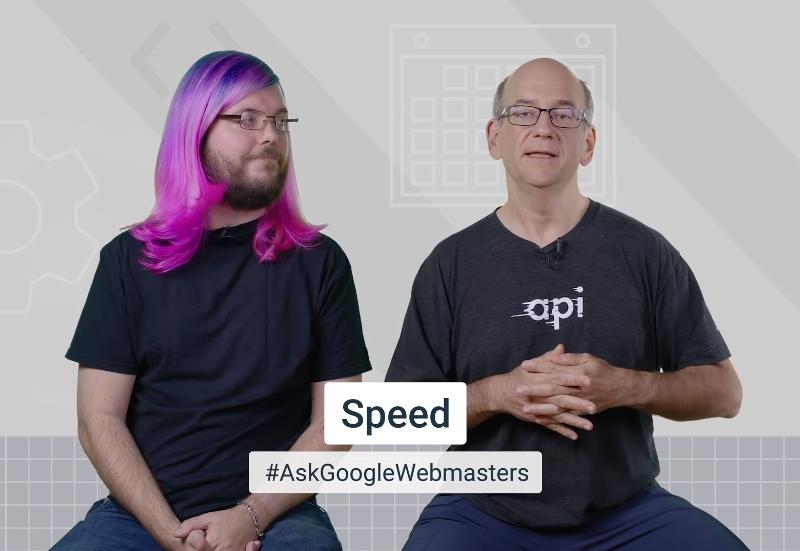Sites’ Speed and SEO, what to know in order to improve
What do SEO specialists must know on speed? This is the question YouTube channel Google Webmasters anwers to, in which John Mueller and Martin Splitt linger to explain questions raised by field workers concerning the site’s speed optimization and its impact on ranking.
There are four main themes the two Google’s Webmasters Trend Analyst are focusing on:
- What is every content’s ideal page speed for a better SERP ranking?
- How important are SEO tools’ data and scores such as Google PageSpeed to the SEO?
- How to correctly use all various tools to evaluate performances?
- What is the best metric to rely on in order to understand if a page’s speed is fine or not?
Let’s see their answers in detail.
Ideal page speed is not really a thing
Summing it up, Google evaluates sites’ pages using two big categories: very good or really bad, without real levels or nuances in between. Speed’s categorization (or, better, the users’ speed experience) is therefore fairly approximative, confesses Martin Splitt directly answering the question on “ranking’s ideal page speed” from a tweet.
More then on this aspect, though, the answer concernes the tools Google uses to evaluate a site’s page speed, and is actually John Mueller to explain that data come in two ways: on one hand, “we try to calculate a theorical speed using lab data” while on the other hand we use “real on-field data, gathered from users that actually tried to use those pages”. This last info are “similar” to those obtained through Chrome user experience report, he adds.
Basically, so, Google gathers “hypothetical and practical” data and does not have any kind of specific thresholds or numeric values to which SEOs could refer to: it does not exist anything like an ideal page speed (meant as minimum or maximum score to reach) , because the only suggestion one could give is “make your websites fast for users“.
Tools to measure speed
Second question refers to the various tools available to measure the site’s speed, and specifically the user asks “if the mobile site’s speed is fine according to the analysis done with specific tools, how important is to the SEO to have an high score with Google PageSpeed Insights?”. The cue allows the googler to discuss which one is the most important tool for the SEO and to SEOs, because “there are lots of tools that measure lots of things“, and this can create chaos.
The main aspect to consider is that the various tools (Test My Site and GTmetrix are particularly quoted) measure parameters in slightly different ways, and that’s why Mueller suggests to try each and every tool available, to gather their data and use them to find out which are the easier to fix site’s weak spots, the so-called “low hanging fruits”, that could increment pages’ speed.
To understand speed’s metrics
A lot more technical is the third question coming from Twitter, because the user asks clarifications on the kind of evaluations devtools Audits do on some specific metrics, such as TTI, FCI and FID. Before answering, Splitt explains us what these acronyms mean:
- FID stands for first input delay, a.k.a how much time the site takes to answer since user’s first input;
- TTI is the time to interactive, that measures when one can actually interact with the page;
- FCI stands for first cpu idle, that reports when the JavaScript ‘s (or other elements that need work on the CPU) is over.
The webmaster trend analyst then clarifies some aspects on the reading of metrics’ data: measurements are not perfect (provided range are pretty wide in the shown example) and also we don’t have to fixate on numbers only, but rather understand which are the most problematic aspects and work to correct them. Always keeping the example as basis, the difference between 0.8 milliseconds and 20 milliseconds is the slightest and the answering values are still positive, while to have a CPU work for a whole minute is an entirely different matter.
Metrics and speed, the best to evaluate SEO performances
The fourth question is also focused on metrics and, specifically, on the ones you have to consider in order to improve the site’s SEO performance; Splitt defines other parameters, such as
- FCP, first contentful paint, a.k.a the amount of time the site needs to show the user its first visual content;
- FMP, first meaningful paint, meaning the amount of time it needs to load its first useful content,
and then he offers his vision.
Basically, the absolute best metrics does not exists because evaluations depends on the site’s nature:
- If you have the kind of site where people only read the contents and don’t interact much, then you need to keep an eye on FCP or FMP values rather then FID or TTI;
- If the site is an “interactive web application” and you actually want the people to directly jump to the content and “do something”, you will probably need to study and optimize FID and TTI metrics above everything else.
Splitt falso gives practical examples: according to him, it makes no sense to have an interaction-oriented site (a messenger), with an extra quick image loading and message history if that is not possible for users to answer messages fast enough because it takes up to “20 seconds before being able to view the text box and actually begin to write”. Similarly, it really is key for a blog to immediately show the contacts’ form at the end of the posts?
The pivotal point, then, is to not only look at the scores, that over-simplify things trying to measure which one could be the user’s perceiving when he access a random page of our site. The “absolute” scores are an aproximative assessment (a ballpark, says Splitt), to only use in order to understand in outlines which are the site’s performances, but mostly which are the critical aspects to work on relatively to the site’s purposes and the experience you would like to provide.
Google and speed, the advices to measure site’s performances
All in all, Google cannot provide a single score or a value to the site’s speed and that’s why there is no such things as an ideal page speed to reach, tell us John Mueller and Martin Splitt, especially since speed includes so many factors that cannot be narrowed to a number.



